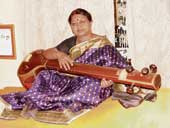 |
| Binapani Mahto practises in her residence in Jamshedpur. Picture by Bhola Prasad |
Binapani Mahato?s contribution to the field of folk music is indeed unprecedented. She is a classical singer of repute. An exponent in Kurmali folk songs, an artist with the All India Radio (AIR), a member of audition board for Kurmali folk music under AIR, Binapani has performed all over the country and has five to six music albums to her credit.
?People negate local music by saying that it is rustic, but I want to prove to them that folk music is as much a part of our tradition as anything else, it has evolved over years through the dedication of our local artists ? says Binapani.
Music comes naturally to the daughter of an exponent of classical music. ?My father was an expert in Hindustani classical music and dance in Orissa. My training started right at home, in fact he was my first teacher.? Her affinity to classical music took her all the way to Vanasthali Vidyapeeth in Rajasthan where she completed her Masters degree in classical music.
?The only reason for opting for Vanasthali was to get talim from my guruji Narayan Vinayak Patwardhan,' explains Binapani.
But destiny had other plans for this powerhouse of talent. She soon made her transition towards folk music. She completed her Ph.D in Jhumar sangeet popular in Jharkhand from Indira Kala Sangeet Vishwavidyalaya in Chattisgarh. Jhumar Sangeet is her forte and that is why she has made its propaganda, a mission in her life.
In the early stages of her career she worked as a music faculty at several institutes, including Agra University, Kurukshetra University, Mahila Maha Vidyalaya Dhanbad and Sant Vinoba Bhave University Hazaribagh, before coming to Jamshedpur where she joined the Graduate School College for Women as the head of the department, music.
Back in the steel city with her family, however, saw a revival of her lost interest in her first love ? folk tunes. ?With time people were slowly forgetting their own culture. I knew that time was right to make an attempt to classify, analyse and document this genre of music,?says Binapani. Her mission took her to the remotest of villages in the Mallbhum region spread across the three states of Bengal, Orissa and Jharkhand. ?Though Malbhum spreads across three states but the people share the art forms. Our research was a realisation in both ways, as we made the local artists realise the richness of the local arts, while we were mesmerised by their songs.? She spent months in the interiors understanding and participating with the local artists. Binapani feels that these regions hold some true stalwarts but ignorance, poverty and lack of guidance impinges on the progress of arts there.
She, thus, struck on the plan to bring artists to her house in Jamshedpur and give them the support of ?learning the nuances of their genre? based on interactions and joint sessions. ?They knew the basics. What they needed to be taught was the rhythmic pattern. In fact many went back and gave further training to other enthusiasts in the villages,' says the dedicated artist.
Documentation, however, proved to be the most difficult part of the task. ?It needed a lot of groundwork to prepare these data. My experience in the field of music helped me a little.?
?I have often been approached by many people to perform in rural areas. People feel that when villagers see city-people playing folk music their pride in the art is reinforced.? She adds, ?My father and my guruji always said one should never lose touch with her roots. They had always encouraged me to give a little back to this beautiful land called India,? says the music teacher a little wistfully.
Apart from her regular duty at the city colleges, currently Binapani is busy working on a project of the department of cultures, government of India. The project is on the revival and documentation of songs, rhythm and tunes of Mayurbhanj Chau.
?It is hectic, all my energy is now engaged in this,' smiles Binapani. Her deep passion for music encourages her to don the mantle of both a teacher and researcher. Her other achievements includes codifying the Jhumar Taal for the first time ever. ?Yes, this is my pioneering project, the chau artistes have a very rich heritage. There is, however, no documentation of their rhythms. Therefore I decided to codify the nitty-gritty of this form, so that people can have a better understanding of the genre? she adds. She is also the advisor to the Mayurbhanj Chau Nritya Pratishtahan Chitrada.
Very soon she would be leaving for Shimla University to conduct a refresher course, for music teachers across the country. She has also guided research associates from Oklahoma University to carry out their project on tribal music. ?It was an enriching experience based on a cultural exchange.? Recently a Moscow community radio station had also asked for her cassettes.
Apart from music what keeps her busy these days is her involvement with Sparsh, an NGO working for poverty alleviation in rural areas. She has the knack to combine a social cause and give it a musical twist. ?Recently we conducted a leprosy eradication project with the help of Chau dancers The message was delivered more effectively this way,? smiles Binapani. With Sparsh she is busy working with the local artisans from the Chaibasa region. ?This project would see the inauguration of a library-cum-archive for the rural artisans,? says Binapani.
She strongly feels that that state needs to do much more in promoting the local arts. ?Like other states there should be a Sangeet Natak Academy out here also. That would promote the local talents on a much wider platform. Also preserve the dying tradition in the form of documents and data' says a concerned Binapani. One understands that this teacher?s journey is far from being over
Nilanjana Ghosh Choudhury










